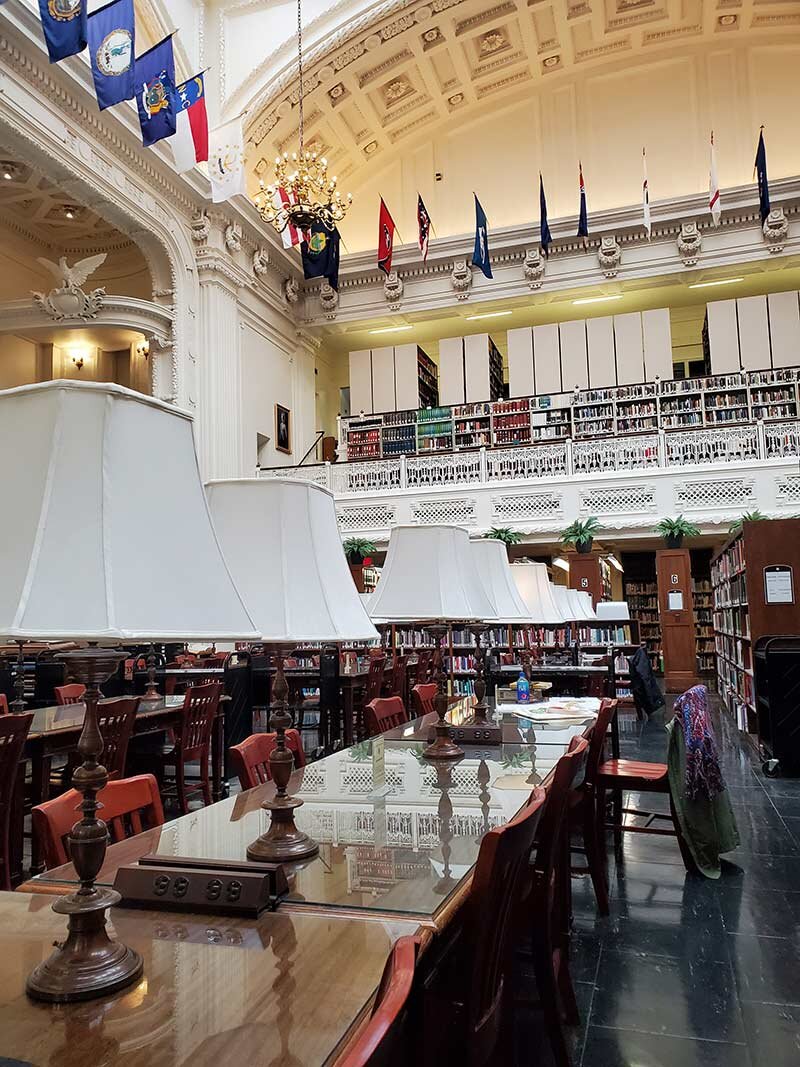Professional Approach, Process and Answers
Inside the Daughters of the American Revolution Library
I always wonder what brings someone to seek and then read a weblog, or in my case a ‘chronicle’. Especially when the chronicle being read is, as in this case, about a topic relating to the practice of professional research and reporting. What do you hope to gain, and why did you decide to take a few minutes out of your valuable time to read this Requisite Research® chronicle? I’m genuinely curious and really want to answer the question. It’s a question I always ask potential clients as we get to know each other. So, let’s discuss why I think you’re here and what a professional can add to the equation. First, it’s highly probable that you’re looking for an answer to a question that you have. Like me, you’re curious and want to find not just an answer, but the correct answer that makes sense. You’re probably reading this chronicle to learn what you can about my Requisite Research® approach and the process I follow in my professional practice. Second, you’re probably also having thoughts about what an experienced and knowledgeable professional has to offer. You’re curious and want to know what makes my offering unique and worthy.
Research, no matter the subject, can be challenging. My guess is that you’ve already started some research on your own and the research you’ve done so far has led you to other questions. Probably, your experience so far has you asking, ‘why hire a professional’ and ‘is professional help really needed?’ The Association of Professional Genealogists (APG), is an organization that I am proud to be a member of. APG has on its website, a great guide[i] titled ‘Hiring a Professional’. if you’re in the market for professional help, in addition to researching me here, I highly recommend a visit to the APG website[ii].
Professionals in any field are thoroughly knowledgeable about their chosen field. Professionals like me follow established best practices for genealogy and family history research to ensure our clients are served well. Professionalism also encompasses education. Like me, professionals regularly attend continuing education to keep abreast of the profession through learning about new tools, new sources and new research offerings at both brick-and-mortar, and online locations. Professionals have experience and often know of sources that are otherwise not widely known. An experienced professional also knows how and where to look for new sources. Professional researchers, like me, know reliable, credible, and relevant sources are the key to finding evidence and answers for clients.
Professional research is my central core service offering among other product offerings. If you’re reading this chronicle as part of researching me and my Requisite Research® approach, let me explain why I think my approach to research is a step above others. The Merriam Webster dictionary online[iii] defines the word ‘Requisite’ as “needed for a particular purpose: ESSENTIAL, NECESSARY”, and with that definition, the dictionary gives the example “has the requisite skills/knowledge/experience for the job”. The dictionary also defines the word ‘Research’ as “1: careful or diligent search, 2: studious inquiry or examination, 3: the collecting of information about a particular subject”. The definitions of the words themselves describe my Requisite Research® approach exactly…. Research that is both essential and necessary, and research that is performed studiously, carefully, and diligently, to collect information about the subject of the question being researched.
Records at Anne Arundel County Clerks Office
I research questions exhaustively for my clients. The Requisite Research® process follows a methodology that begins with a joint definition and agreement on the question(s) to be answered. With an objective identified, I plan and estimate an effort considering client time and cost constraints. The Requisite Research® approach identifies and prioritizes essential sources that are believed necessary for finding credible and relevant evidence. Then, with a client’s approval to proceed, research is scheduled and started. Found evidence is recorded and noted for reference. Sometimes found evidence will directly support a needed answer. Otherwise, certain indirect evidentiary facts may, when considered together, result in a convincing conclusion providing a needed answer. Sometimes new questions emerge which may require further research. In the end, formal reporting sews everything together into a written assertion of undeniable proven facts based upon the evidence uncovered.
It’s my hope that this chronicle provided you with answers to your questions about my Requisite Research® approach to professional genealogy and family history research. Let’s talk about your discoveries to date, and about your other questions and needs for professional help going forward.
[i] Hiring a Professional. (Association of Professional Genealogists. https://www.apgen.org/cpages/how-to-hire-a-professional-genealogist : accessed on 20 March 2020).
[ii] Website for the Association of Professional Genealogists. Accessible online at https://www.apgen.org/ .
[iii] Merriam-Webster’s Online Dictionary (11th ed). (Merriam-Webster.com. https://www.merriam-webster.com : accessed 20 March 2020).


